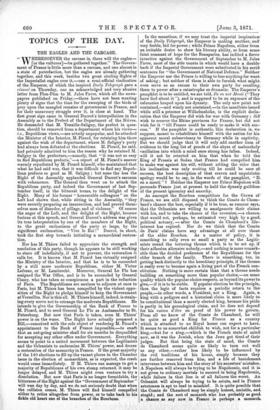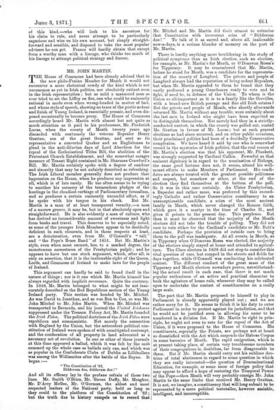TOPICS OF THE DAY.
THE EAGLES AND THE CARCASE.
"17 HERE SOEVER the carcase is, there will the eagles— [or the vultures]—be gathered together." The Govern- ment of France is little more than a carcase, and one almost in a state of putrefaction, but the eagles are already gathering together, and this week, besides two great circling flights of the Imperialist eagles over it,—one a semi-official vindication of the Emperor, of which the inspired Daily Telegraph gave a resume on Thursday, one an acknowledged and very abasive letter from Plon-Plon to M. Jules Favre, which all the news- papers published on Friday,—there have not been wanting plenty of signs that the time for the swooping of the birds of prey upon the mangled remains of government in France, and for their unsavoury struggle over it, is close at hand. The first great sign came in General Ducrot's interpellation in the Assembly as to the Prefect of the Department of the Nievre. He demanded that M. Tenaille-Saligny, the prefect in ques- tion, should be removed from a department where his views- i.e., Republican views,—are utterly unpopular, and he attacked the Minister of the Interior, M. Picard, for retaining him there against the wish of the department, where M. Saligny's party had always been defeated at the elections. M. Picard, he said, had privately admitted to him the reason why he retained M. Saligny in the prefecture,—namely, that "it was not so easy to find Republican prefects,"—a report of M. Picard's answer warmly repudiated by M. Picard himself, who maintained that what he had said was, that it was difficult to find any Repub- lican prefects so good as M. Saligny ; but none the less the Eight of the Assembly applauded General Ducrot's sarcasm with vehemence. The General then went on to attack the Republican party, and indeed the Government of last Sep- tember itself, in the bittereit terms, to the delight of the Right. Many of his former "honourable colleagues" on the Left had shown that, while sitting in the Assembly, "they were secretly preparing an insurrection, and had proved them- selves men of disorder, of pillage, and of violence." Of course the anger of the Left, and the delight of the Right, became furious at this speech, and General Ducrot's address was given its true interpretation by one of the members of the Right, to the great enthusiasm of the party at large, by the significant exclamation, " Vive le Roi !" Ducrot, in short, took the first step towards initiating a monarchical restora- tion.
Nor has M. Thiers failed to appreciate the strength and resolution of this party, though he appears to be still working to stave off indefinitely, if not to prevent, the restoration it calls for. It is known that M. Picard has virtually resigned the Ministry of the Interior, and that he is to be succeeded by a still more moderate Republican, either M. Victor Lefranc, or M. Lambrecht. Moreover, General Le Flo has resigned the War Office, and is to be succeeded by General Cissey, who has taken so conspicuous a part in the reduction of Paris. The Republicans are anxious to adjourn at once to Paris, but M. Thiers has been compelled by the violent oppo- sition of the Right to pledge himself to keep the Government atVersailles. Nor is this all. N. Thiers himself, indeed, is strain- ing every nerve not to estrange the moderate Republicans. He intends to give the Governorship of the Bank of France to M. Picard, and to send General Le Flo as Ambassador to St. Petersburg. But now that Paris is taken, even M. Thiers' power is on the wane. The Right have actually prepared a Bill,—conceived with the sole object of rendering M. Picard's appointment to the Bank of France impossible,—to enadt that an out-going minister shall for six months be disqualified for accepting any other office under Government. Everything seems to point to a united movement between the Legitimists and the Orleanists to undermine M. Thiers' power, and decree a restoration of the monarchy in France. If the great majority of the 140 elections to fill up the vacant places in the Chamber issue in the election of monarchists, as is expected, the crash would come immediately. If M. Thiers can manage to get a majority of Republicans of his own stamp returned, it may be longer delayed, and N. Thiers might even venture to try a dissolution. But now that Paris is no longer formidable, the bitterness of the Right against the "Government of September" will wax day by day, and we do not seriously doubt that when the collision comes, M. Thiers will find himself compelled either to retire altogether from power, or to take back to his fickle old heart one of the branches of the Bourbons. In the meantime, if we may trust the imperial inspiration. of the Daily Telegraph, the Emperor is making another, and. very feeble, bid for power ; while Prince Napoleon, either from an irritable desire to show his literary ability, or from some faint remnant of hope for the Bonapartes, has indited a fierce' invective against the Government of September to M. Jules- Favre, most of the able taunts in which would have a double. barb if the Imperial Government were substituted in his acrid. sentences for "the Government of National Defence." Neither. the Emperor nor the Prince is willing to lose anything for want. of asking ; but neither of them is able to furnish what might. even serve as an excuse to their own party for recalling, them to power after a catastrophe so dramatic. The Emperoe& pamphlet is to be entitled, we are told, us en ont Mend ("They have lied about it "), and is supposed to be an exposure of the calumnies heaped upon his dynasty. The only new point not- contained,—and wisely not contained,—in the manifesto issued' while still a prisoner at Wilhelmshohe, is the explicit decla- ration that the Emperor did wish for war with Germany ; did' wish to recover the Rhine provinces for France, but did not wish for it "till France could be ready to make it with suc- cess." If the pamphlet is authentic, this declaration is, we suppose, meant to rehabilitate himself with the nation for his apparent moral subserviency to Germany while in captivity. But we should judge that it will only add another item of evidence to the long list of proofs of the abyss of melancholy. vacillation into which a mind once strong has fallen. Indeed,. will it not be retorted on him that when he told the. King of Prussia at Sedan that France had compelled him, to make war against his will, without adding the rider that. his inclination was only waiting till he could be sure o6 success, the best description of that craven and unpatriotic apology would be to say, in the words of the pamphlet, "IL en a menti " ? Neither the Emperor nor Prince Napoleon will, persuade France just at present to hold the dynasty guiltless-. of the present ignominy and anarchy.
As amongst the Bourbon competitors for the Crown of' France, we are still disposed to think the Comte de Cham- bord's chance the best, especially if it be true, as rumour says,. that the Orleanists are willing to amalgamate their claims with his, and to take the chance of the reversion,—a chance.: that would not, perhaps, be estimated very high by a good.. political actuary, — after the Comte de Chambord's life- interest has expired. Nor do we think that the Comte de Paris' claims have any advantage at all over those of the elder Bourbon. As a matter of policy, it is. something to rally even so small a party as the Legiti- mists round the tottering throne which is to be set up, if their adhesion alienates nobody,—and nothing is more remark- able than the decided preference of the Republicans for the' older branch of the family. There is something, too, ia. getting back distinctly to the hereditary principle, if the throne. is really ever to become again a living part of the French con- stitution. Nothing is more certain than that a throne needs. building on something more than popular choice,—on soma quality which the popular choice respects, as beyond its power to give,—if it is to be stable. If popular election be the principle,. then the logic of facts requires a periodic return to the, people,—in other words, a President, not a King. Again, a. king with a pedigree and a historical claim is more likely to. be constitutional than a merely elected king, because his pride is partly in his genealogical claim, and he does not depencl for his raison d'être on proof of his power to govern. From all we know of the Comte de Chambord, he will be quite as good a King for France as a country which is attached to no Royal house can expect to have.. It seems to us somewhat childish to wish, not for a particular king,—but for a king,—which is the French state of min& now, as it was the Jewish, when the Jews got tired of their judges. But that being the state of mind, the Comte de Chambord seems quite as likely to turn out well as any other,—rather less likely to be influenced by the evil traditions of his house, simply because they are further removed from him, and a life of banishment. intervenes between him and the story of his ancestors' mistakes.. A Napoleon will always be trying to be Napoleonic, and it in not given to ordinary mortals to succeed in being Napoleonic, while failure in that line is of all failures the worst. An Orleanist will always be trying to be astute, and in France astuteness is apt to lead to mischief. It is quite possible that. the Comte de Chambord may be simply honest, amiable, and. stupid ; and the sort of monarch who has probably as good. a chance as any now in France is perhaps a monarch
of this kind,—who will look to his ancestors for his claim to rule, and never attempt to be particularly sagacious and wise on his own account, but simply straight- forward and sensible, and disposed to take the most popular advisers he can get. France will hardly obtain that except from a worthy man with a lineage, who thinks too much of his lineage to attempt political strategy and finesse.



































 Previous page
Previous page